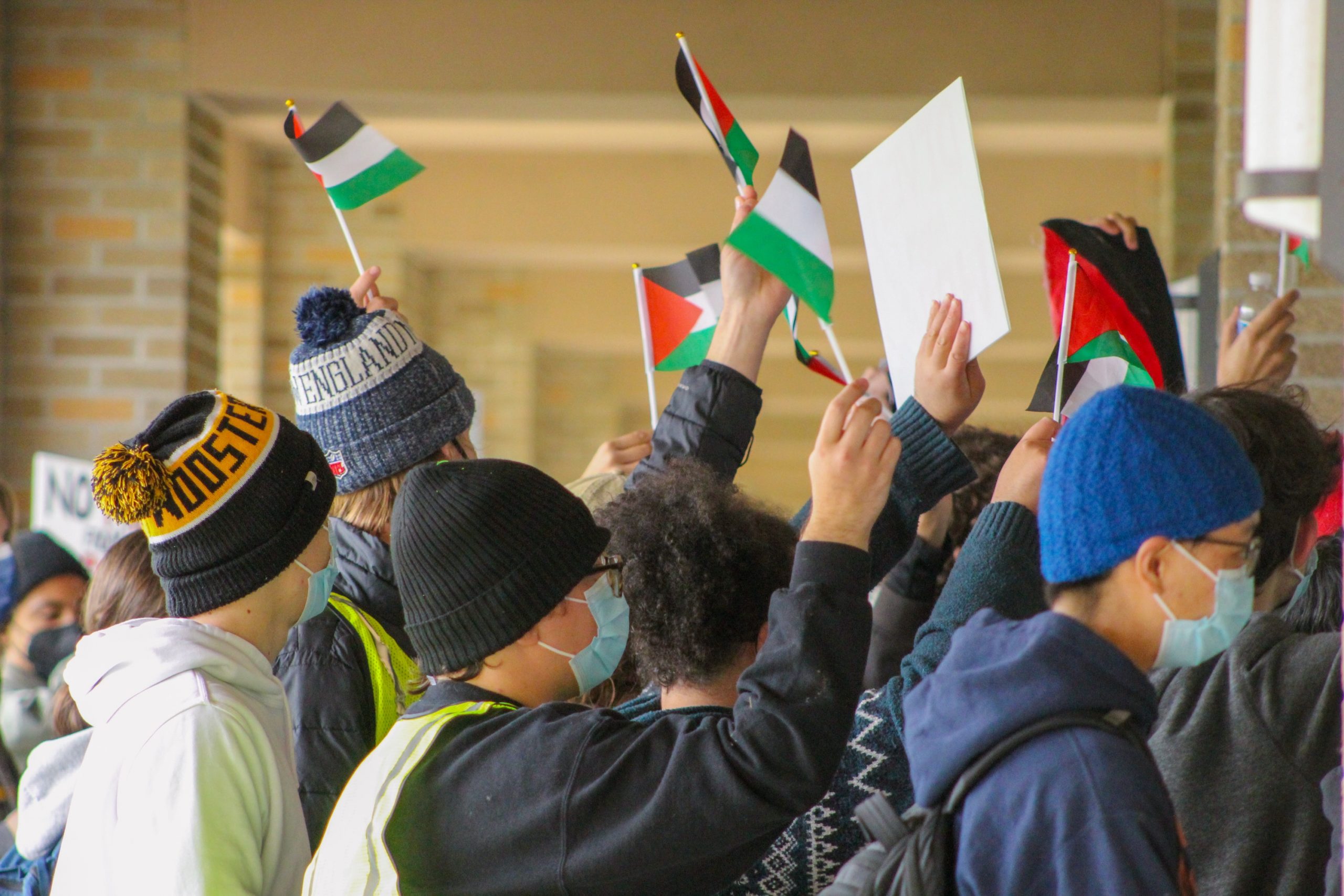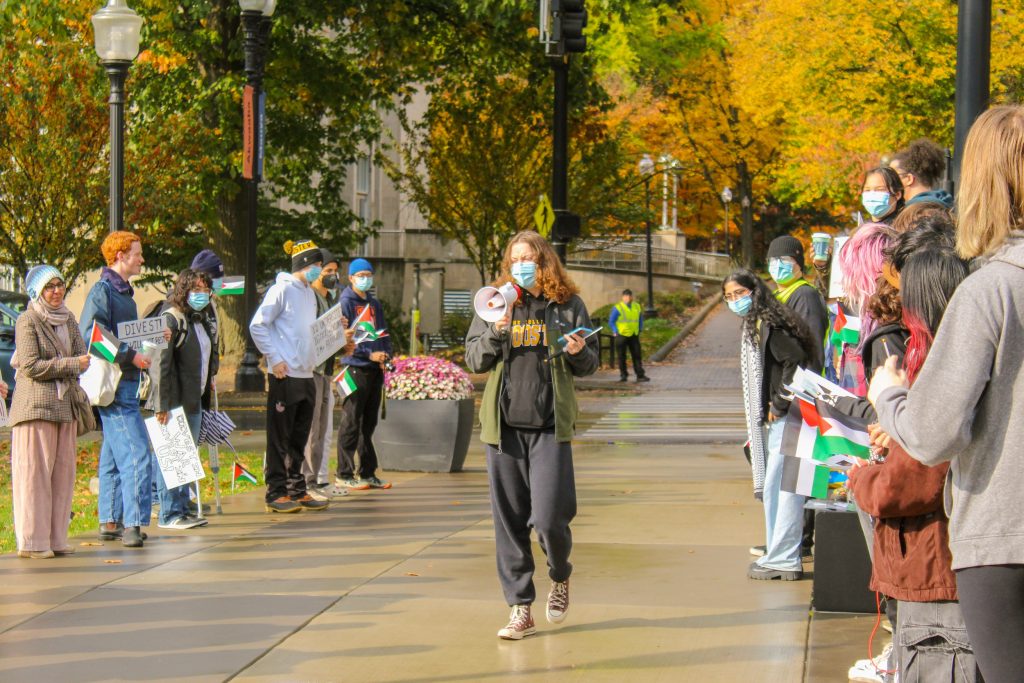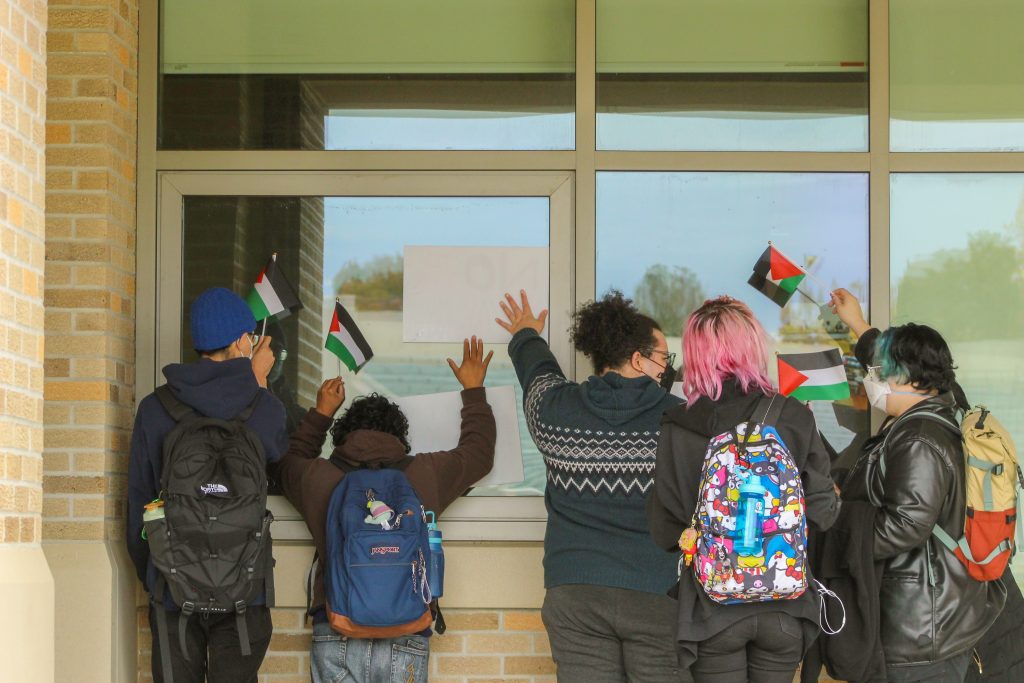
Julia Garrison
News Editor
“Hey hey, ho ho, the war machine has got to go,” called out protester Leo Daoud ’26 into a megaphone while over 70 students, faculty and staff stood outside of Lowry Student Center on Friday, Oct. 25.
Protestors lined the edges of the walkways to Lowry, with most donning masks and holding Palestinian flags. The demonstration went from 11 a.m. to around 1:30 p.m. with the crowd traveling to and from outside of the Governance Room of the Scot Center — with the intent of having their voices heard by the board of trustees, who met on campus this weekend.
The protest, planned by a group of students called the Divestment Coalition, gained traction the day before it was slated to take place. Between 11 a.m. and 1 p.m. on Wednesday, students handed out information fliers about the protest, which invited community members to “join [them] in [their] call for Wooster’s divestment from war manufacturing.”
A QR code on the flier led to a PDF explaining the group’s overarching goals, their definition of divestment and their objectives for this specific protest. The flier claims that Wooster is “exposed to Israeli stocks,” and that the College is invested in companies that are “complicit in the genocide and Israeli occupation in Palestine.”
In an interview with the Voice a few days after the event, Caroline Ward ’25, communications director for the Divestment Coalition, said that the event’s goal was to establish recurring meetings with members of the board of trustees.
“It’s been pretty silent on campus,” Ward said, stating that there had been little direct administrative and extracurricular action taken in relation to the war in Gaza beyond campus-sanctioned vigils through the office of Religious and Spiritual Life. The group had been meeting informally, using time from Leftists of Wooster’s meetings, though Ward emphasized that they were not affiliated.
Ward explained that the group wanted to take advantage of the board of trustees’ presence on campus this weekend in an attempt to reach their goal: a recurring meeting with the board of trustees. The group’s name, the Divestment Coalition, references students’ successful calls for divestment from companies in South Africa during the eighties.
“If we did it once, we can do it again,” said Ward. “It’s our responsibility to not have our tuition funded by … war and genocide. It’s the exact same predicament, just … many decades later. They were successful and we’d like to be too.”

Ward also opened the gathering on Friday, followed quickly by Co Clark ’25, a key player in last year’s demonstrations, including the Galpin Hall sit-in in May.
After standing outside of Lowry for over half an hour, the group migrated to outside of the Governance Room, where the board of trustees were meeting. Director of Human Relations and Interim Vice President of Diversity, Equity, Inclusion and Belonging Lin Hillis met with protestors outside of the room, talking with Ward as other protestors attempted to intervene.
Some protestors asked Hillis for a direct citation from the Scot’s Key –– which she did not provide, but agreed to discuss the Scot’s Key with protestors with Interim Vice President for Student Affairs and Dean of Students Ashley Reid, who was giving the final presentation during the board’s meeting that afternoon.
While Hillis did not mention a citation from the Scot’s Key in the moment, she did mention that students cannot interrupt official college business –– which is outlined in the Scot’s Key’s conduct system section, beginning on page 41.
The code of conduct prohibits the specific “[d]isruption or obstruction of teaching, research, administration, disciplinary proceedings, other College activities, or of other authorized non-College activities when the conduct occurs on College premises.”
Some protestors surrounding the conversation between Hillis and Ward appeared confused and did not understand what “business” meant by definition, which Hillis explained as being broad. Some protestors also expressed confusion on the meeting occurring in the Governance Room –– many not being aware of what the board of trustees does in relation to the College.
When Hillis departed, the protestors partially complied with her requests –– pressing signs up against the windows into the Governance Room and tapping on the windows with the ends of Palestinian flags. Campus safety also made a brief appearance to monitor the situation.

The group made the trek back to the front of Lowry for the final hour after the trustee meeting concluded, but stood at the front entrance while all but a few trustees filed in the back entrance of the building.
“We’re fucking sick and tired,” said Ward to the group after they had made it back to the front of Lowry. She then reiterated the group’s plan and mission, citing apartheid in South Africa and Wooster’s divestment, which was also mentioned in multiple fliers distributed by organizers. “We have a moral and ethical obligation to know what benefits us.”
President Anne McCall made her first brief appearance, walking through the cleared walkway while protestors chanted “commit, divest, we will not stop, we will not rest.” McCall would not acknowledge the protest until after the event was finished, when she made her second appearance and talked to a scattered number of organizers.
Aidan Loop ’25 took the megaphone, explaining that they had skipped classes that day in solidarity with Palestinian students in Gaza. Loop also spoke about divestment during the open question and answer section of Missions and Outcomes. Loop noted that an investigation done by The College of Wooster for Palestine found that as recently as 2022, the College had invested in facial recognition softwares that were being used “in a country currently committing genocide.”
“We owe it to each other to make sure that this college doesn’t have blood on its hands,” said Ward in her closing statement. The crowd then broke into another chant before attendees dispersed.
Following the end of the event, McCall made another appearance to what had become a smaller group of students. McCall spoke to Ward, asking her why they were protesting that day. Other students gathered around the two as Ward reiterated the coalition’s goals.
“Your ask is not exactly the same as last year, which I think is really interesting,” McCall said in response to Ward’s explanation of their mission and goals. McCall mentioned that she was passing through the event not to “do anything in particular other than hear you.”
McCall then explained that the board of trustees “speaks through its resolutions,” and that the board meetings are private matters. McCall offered the opportunity of Missions and Outcomes and its uniqueness to Wooster — noting that the event happens “every trimester.” Missions and Outcomes only occurs twice in the academic year.
Emma Anderson ’26 then explained to McCall that they had requested to speak at Missions and Outcomes about divestment but were not given a slot to do so, claiming that the group was told that it was “not the time or place to talk about investment.”
Current trustee Thomas Gibian ’76 entered the conversation, opening the discussion to present his proposed solution in regards to divestment within the College.
Gibian proposed a hypothetical situation for students to share the top 10 companies that they considered the “worst” and the most “egregious” on Wooster’s portfolio, although students cannot access any information about the portfolio.
“You tell us the ten that you feel the strongest about,” he said. “We can’t tell you what we’re invested in, but we can tell you that we’ll honor your request unless we believe it will make a material difference to our return.”
Before Gibian’s departure to the next round of trustee meetings that Friday afternoon, he urged Ward and Anderson to “find a doable thing” for the College to respond to.
An additional point of concern outside of divestment for protestors was the new Student Speech and Demonstration Guidelines –– guidelines that have been in the works since the beginning of the semester.
In an interview with the Voice, Reid cited that the “policy” that was referred to by protestors was actually a set of guidelines. The Student Speech and Demonstration Guidelines are only drafted, but have been points of discussion at both Scot Council general assemblies and executive meetings. The guidelines, spurred by the recent wave of on-campus protests across the United States related to the war in Gaza, are supposed to help organizers ensure their event is in accordance with conduct rules laid out in the Scot’s Key.
Per the drafted guidelines, students planning to organize a protest should reach out to the Dean of Students office 48 hours before the event is slated to take place if it will take place on a weekday, and 72 hours beforehand if the event will take place on the weekend.
“At no point anywhere in this document are we restricting speech. We’re actually encouraging it,” said Reid. “Protest is a part of our DNA, and demonstrations are part of who we are.”
Reid also shared that protestors had not reached out to set up a formal meeting with any members of the Dean of Students office, but that other students had reached out to voice their concerns against the protest. The number of emails received by the Dean of Students office was not shared. Administrators plan to identify and reach out to students they recognized at the protest, both in and out of student organizations.

